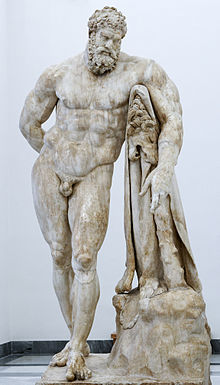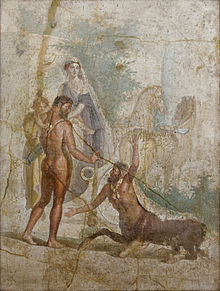
Back Herakles Afrikaans Herakles ALS ሄራክሌስ Amharic هرقل (أسطورة) Arabic Heracles AST Herakl Azerbaijani Геракл Bashkir Herakles BAR Геракл Byelorussian Гэракл BE-X-OLD
| Heracles | |
|---|---|
God of strength and heroes Divine protector of mankind and the patron of the gymnasium | |
 One of the most famous depictions of Heracles, Farnese Hercules, Roman marble statue on the basis of an original by Lysippos, 216 CE. National Archaeological Museum, Naples, Italy | |
| Abode | Mount Olympus |
| Symbol | Club, lion skin |
| Genealogy | |
| Born | |
| Died | |
| Parents | Zeus and Alcmene |
| Siblings | maternal: Iphicles, Laonome; paternal: Apollo, Artemis, Athena, Dionysus, Helen of Troy, Perseus and many others |
| Consort | Megara, Omphale, Deianira, Hebe |
| Children | Alexiares and Anicetus, Telephus, Hyllus, Tlepolemus |
| Equivalents | |
| Canaanite | Melqart[1] |
| Etruscan | Hercle |
| Roman | Hercules |
| Part of a series on |
| Greek mythology |
|---|
 |
| Deities |
| Heroes and heroism |
| Related |
|
|
| Part of a series on |
| Ancient Greek religion |
|---|
 |

Heracles (/ˈhɛrəkliːz/ HERR-ə-kleez; ‹See Tfd›Greek: Ἡρακλῆς, lit. "glory/fame of Hera"), born Alcaeus[2] (Ἀλκαῖος, Alkaios) or Alcides[3] (Ἀλκείδης, Alkeidēs), was a divine hero in Greek mythology, the son of Zeus[4] and Alcmene, and the foster son of Amphitryon.[5] He was a descendant and half-brother (as they are both sired by the god Zeus) of Perseus. He was the greatest of the Greek heroes, the ancestor of royal clans who claimed to be Heracleidae (Ἡρακλεῖδαι), and a champion of the Olympian order against chthonic monsters. In Rome and the modern West, he is known as Hercules, with whom the later Roman emperors, in particular Commodus and Maximian, often identified themselves. Details of his cult were adapted to Rome as well.
- ^ Lima, Rodrigo Araújo de (January 2019). "Herakles/Melqart, the Greek façade of a Phoenician deity". Revista Hélade: Dossiê Fenícios.
- ^ Schmitz, Leonhard (1867). "Alceides". In William Smith (ed.). Dictionary of Greek and Roman Biography and Mythology. Vol. 1. Boston: Little, Brown and Company. p. 98. Archived from the original on 2008-05-27.
- ^ Bibliotheca ii. 4. § 12
- ^ Apollodorus, 1.9.16
- ^ By his adoptive descent through Amphitryon, Heracles receives the epithet Alcides, as "of the line of Alcaeus", father of Amphitryon. Amphitryon's own, mortal son was Iphicles.